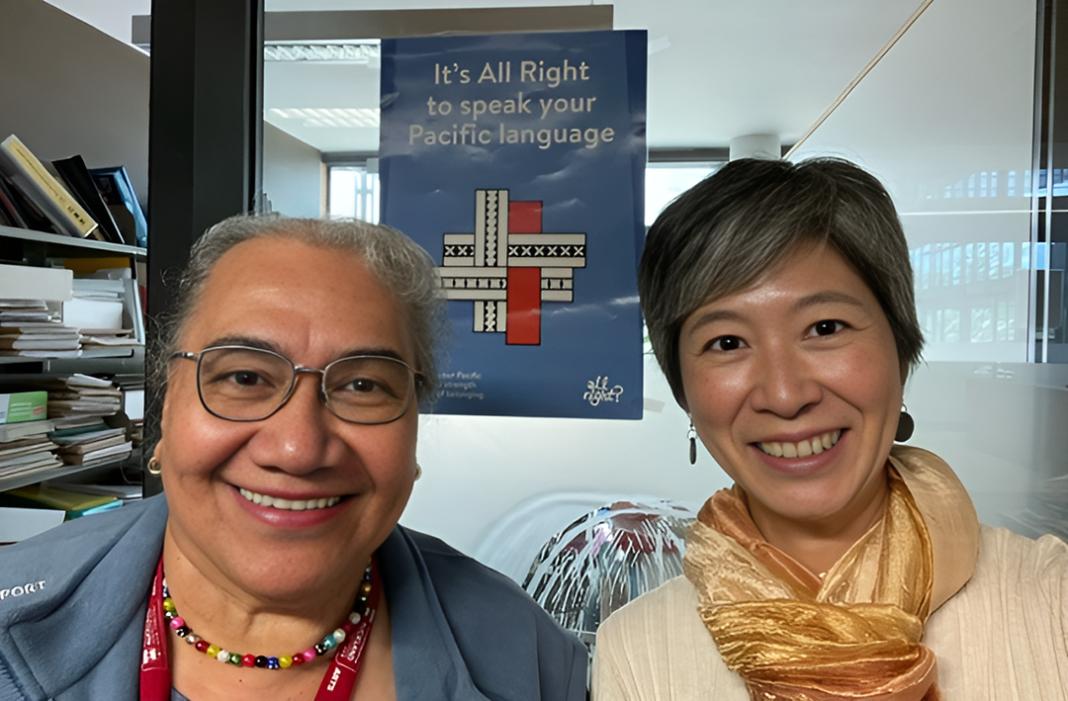A visiting Japanese scholar has spoken out about the importance of keeping Pacific languages alive in the diaspora.
Professor Yuko Otsuka, a linguist from Sophia University in Japan, has been a guest of the University of Auckland’s Centre for Pacific Studies, Te Wānanga o Waipapa. She specializes in Tongan and Polynesian languages and held a seminar last week about the maintenance and revitalization of Pacific languages.
She began her talk by answering the obvious question – how does a Japanese academic come to develop a strong interest in Pacific languages and in particular Tongan?
It was a voluntary stint with the Japan International Cooperation Agency 34 years ago in 1990 at Vava’u High School in the Kingdom of Tonga; Otsuka told the audience that some of them may not have been born then.
During her two years of teaching, she formed a strong connection with the Tongan culture and its people, picking up the language as a means to communicate with both the elderly and youth.
“I really enjoyed living there, and I really wanted to go back.”
She thought a master’s degree might help her prospects to find a job in Tonga. But at Oxford University, her professor at graduate school became fascinated by the ‘Japanese girl who could speak Tongan,’ and encouraged her to pursue studies at the doctoral level.
“I wasn’t planning to do a PhD, but at the end of the master’s course, my professor asked when was I going to do a PhD?”
She then made the switch from teaching Japanese to linguistics, going on to specialize in formal syntax and theoretical linguistics with a focus on Tongan.
However, Otsuka says many at Oxford University assumed Tongan was an African language mainly because they had no knowledge of Tonga.
“I had to keep telling people it was spoken in the Kingdom of Tonga in the Pacific, and not in Africa,” she says. Although years later, she learned about the Tonga people of Zambia and Zimbabwe.
After leaving Oxford, Professor Otsuka moved to Hawai’i where she taught linguistics for sixteen years before moving to Sophia University in Tokyo in 2016.
Head of the Centre for Pacific Studies, Te Wānanga o Waipapa, Professor Yvonne Underhill-Sem, says it’s been invaluable having a renowned scholar like Professor Otsuka spend time at the University. She says Otsuka was particularly interested in the research of distinguished Tongan linguist Dr. Melenaite Taumoefolau, a senior lecturer at the Faculty of Arts.
“I’m not sure how many other Pacific Studies programs are taught in Universities. It’s exciting to see Melenaite’s work attract international attention,” says Professor Underhill-Sem.
Earlier this year, Dr. Taumoefolau presented the welcoming address at the New Zealand Association of Language Teachers Biennial Conference, and the World Congress of the International Federation of Language Teacher Associations 2024 – Rethinking Pacific Language Teaching.
Dr. Taumoefolau has been a strong advocate for the revitalization of Pacific languages both locally in Aotearoa and internationally and said Professor Otsuka’s visit emphasized the value of Pacific languages.
“Professor Otsuka’s visit was a great opportunity to share innovative strategies and explore developments around maintaining and revitalizing languages. It was wonderful to see those with a keen interest in Pacific languages come along to her seminar and have the experience of seeing someone outside of our communities recognize the value of our languages, and why their retention is so important.”
It was Otsuka’s first time visiting Aotearoa; she says given her love of Pacific languages, it has been high on her list of places to visit.
“Where else in the world can you find a University that teaches so many Pacific languages?”
Otsuka said it was encouraging to be well received and was pleased with the turnout at her seminar.
“I was surprised to see a room full of people, there were also people from outside of the University, from the community who had shown up to hear my talk.”
She says using heritage languages in the home, in a collective effort, to maintain Pasifika languages in the diaspora was highly effective. A language acquisition project she conducted in Hawai’i (funded by the Japan Society for the Promotion of Science) demonstrated the success of this approach.
Otsuka says it involved recording interactions between a grandmother and her pre-school granddaughters to understand how children acquired the Tongan language at home.
“The grandmother didn’t speak English and the young children didn’t speak Tongan, eventually the children picked up Tongan, and as a result, there was an increase of the family speaking Tongan at home.
“If you use the language at home and do so consistently, children will acquire the language, you don’t have to ‘teach’ them. You will give them the gift of being able to speak the language of their ancestors.”






